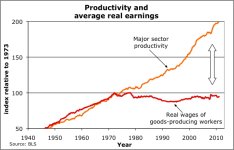There is a shortage of well-paying secure jobs because of wages being lower elsewhere and capital mobility.
In fact one of the reason the standard of living is so high here is that instead of wasting our expensive labour on producing raw materials, we get other people to do it for us cheaper, which frees up labour to provides other goods and services which make our lives better.
Apparently not. Previously rising wages have been stagnant and workers increasingly insecure, indebted and welfare-dependent ever since we started getting other people to make stuff (not just raw materials) for us cheaper. Savings from cheap imports have been more than eaten up by housing and other costs for most people.
But apparently some people think our lives would be better if we stopped providing ourselves with those extra goods and services.
No, they're saying the above begets a demand-constrained economy with reduced capacity utilisation and productivity growth, prone to debt bubbles and financial crises.
And
what extra goods and services? Telesales? Burger flipping?

